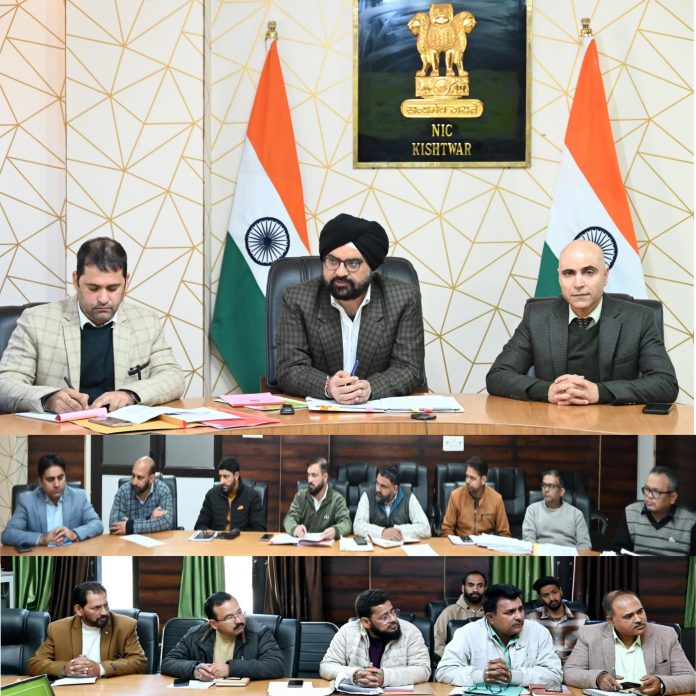Reviews progress on formulation of district’s PM-DDKY plan
KISHTWAR: Joint Secretary, Union Ministry of Food Processing Industries (MoFPI), Preet Pal Singh, who is also Central Nodal Officer for the Pradhan Mantri District Development and Kisan Yojana (PM-DDKY) for district Kishtwar, chaired a detailed review meeting here today to assess the progress of the district’s PM-DDKY plan formulation.
The Joint Secretary is on his five-day visit to Kishtwar, during which he will undertake multiple field visits across agriculture and allied sector clusters, interacting directly with farmers, entrepreneurs, and project stakeholders.
During the review meeting, the Joint Secretary examined preparatory activities, including baseline data collection, identification of potential crop clusters, existing and proposed food-processing units, infrastructure gaps, and stakeholder consultations. He emphasized on participatory and convergence-oriented approach to ensure the plan reflects ground realities and meets beneficiary needs.
Highlighting Kishtwar’s unique agro-climatic advantages and high-value crops like saffron, walnuts, rajma, and medicinal plants, the Central Nodal Officer stressed the importance of developing robust processing and value-chain infrastructure.
The Joint Secretary directed departments to support Farmer Producer Organizations (FPOs), micro-enterprises, technology integration for post-harvest management, and enhanced market linkages.
Various departments provided updates on progress and challenges in plan preparation. He advised timely submission of pending components while maintaining accuracy and transparency in data inputs. He reiterated that the PM-DDKY plan should prioritize sustainable agriculture, employment generation, food-processing growth, and region-specific development goals.
The Joint Secretary appreciated the proactive efforts of the district administration and encouraged coordinated action among all stakeholders for successful PM-DDKY implementation in Kishtwar. He noted that the scheme has the potential to significantly boost the local agri-economy and provide long-term benefits to farmers, entrepreneurs, and youth.
During the meeting, Deputy Commissioner Kishtwar, Pankaj Kumar Sharma presented a detailed profile of district and highlighted that with the vast experience and guidance of Central Nodal Officer, the district is hopeful of drawing up practical strategies and laying a strong foundation for the effective implementation of this important scheme.
He informed the Joint Secretary that Kishtwar, the largest district in Jammu and Kashmir by area but with a population of just 2.3 lakh (Census 2011), relies primarily on agriculture and allied sectors such as horticulture, Animal husbandry, and Fisheries. Recognized as one of the 100 Aspirational Districts under the Prime Minister Dhan Dhanya Krishi Yojana, Kishtwar aims to unlock its untapped agricultural potential, he added.
He informed that the District Administration has already started preparing a comprehensive plan in consultation with the line departments to ensure the scheme’s scientific and professional rollout.
The Deputy Commissioner highlighted key focus areas, like expanding cultivation, implementing micro-irrigation projects, and introducing modern scientific practices to enhance productivity. Measures are being undertaken to promote high-yielding hybrid varieties, encourage sustainable water management, and strengthen both forward and backward market linkages to ensure farmers gain economic benefits, he added.
He emphasized that these targeted interventions aim not only to increase farmer incomes but also to establish a self-reliant, sustainable agricultural model tailored to Kishtwar’s unique geography, bridging existing gaps and boosting the district’s productivity indicators in alignment with national priorities.
ACR Kishtwar Idrees Lone; ACD Kishtwar Musharaf Ali; CAO Kishtwar Kushal Chandel; CHO Kishtwar Sajid Mustafa; ExEn Jal Shakti Kishtwar Sanjeev Kumar Gupta; DSHO Kishtwar, LDM Kishtwar, technical experts, stakeholders from agriculture and allied sectors, and representatives of implementing agencies also attended the meeting.


